
2024 Wisconsin State Legislature Voter Guide: The State Senate
It won’t be until 2026 when Democrats have a realistic chance to flip the State Senate, but several key races will significantly shift the balance of power in the legislature’s upper chamber.
This is part of The Recombobulation Area and Civic Media’s 2024 Wisconsin State Legislature Voter Guide. Read the first part of the series, “New Board, New Game,” here. See the comprehensive preview and find your district at the Civic Media Voter Guide here.
Maps used here are from CNalysis, which projects state legislative races all over the country. Image used with permission. All graphics by Jade Shepherd.
Among the duties the Wisconsin State Senate is responsible for is to confirm appointments made by the governor to lead various state agencies, boards and commissions. But, as Tony Evers was set to begin his second term as governor in January of 2023, the Republican-controlled State Senate was yet to confirm nearly 180 of the governor’s appointmentsfrom his first term — a comically absurd number.
For many of these appointments, the State Senate kept these individuals in a sort of perpetual limbo, where those appointed to serve in these roles, worked full-time in these roles, but at any moment, Republicans in the chamber could vote to reject any of these appointments, effectively firing them. In October of 2023, Senate Republicans did just that. In response, State Sen Melissa Agard, the Senate’s Democratic Leader, called this rejection “unprecedented,” noting that since 1981, only five executive appointments had been rejected. This happened again in March of 2024, and has happened several times during this era of divided government in Wisconsin.
These rather unprecedented instances serve as examples of how Senate Republicans have repeatedly abandoned the norms of governing in the state of Wisconsin, taking hyper-partisan action on things that had previously been customary duties of the legislative branch.
Consider, too, that one of the appointments Senate Republicans did make — and have not rescinded despite repeated calls to do so — is Senate Majority Leader Devin LeMahieu re-appointing Bob Spindell to the Wisconsin Elections Commission, which happened after Spindell was one the state’s 10 “fake electors,” as part of the Republican effort to overturn the 2020 presidential election (which Spindell and the nine others later admitted to in court to settle a civil lawsuit).
Part of why the Republicans running things in the legislature have been able to repeatedly take actions like these, though, is because they are so insulated from the type of accountability that can normally be delivered at the ballot box, as the state legislature’s gerrymandered maps made it nearly impossible for Democrats to win a simple majority.
The Wisconsin State Senate has been under Republican control since the 2010 election, winning distinct majorities each election year after those gerrymandered maps gave them major advantages from 2012 onward. Before the 2022 election, Republican-advanced maps pushed the boundaries even further, with the GOP drawing themselves a path to a supermajority.
They succeeded in the Senate, winning 22 of the chamber’s 33 seats. But without an Assembly supermajority, the impact of that advantage was limited. But from an electoral standpoint, this serves as a clear example of just how tilted these maps had become, where Republicans could achieve a two-thirds supermajority in such a closely divided purple state.
Now, with new maps, the days of a Republican path to a two-thirds supermajority in an otherwise 50-50 state appear to be over. But that does not yet mean the Senate majority is in play for Democrats.
Earlier this year, as decision time neared on selecting new maps, a certain point emerged that differentiated some of the map submissions being considered by the Court-appointed experts — the numbering of Senate districts. Some parties’ maps had renumbered the entire Senate, which would have put the majority in play this year, but some did not. Maps submitted by Gov. Tony Evers did not, and those are the ones that were eventually signed into law.
So, the majority in the Senate will not realistically be in play for Democrats until 2026. Senators serve four-year terms, and those in even-numbered districts are up this year, and the senators in odd-numbered districts break down with 12 Republicans and just five Democrats (and even if some of those Republican senators in odd-numbered districts are drawn into ones with even numbers, they do not have to move until their term is up in two years). So, even before this year’s election, the overall balance of the chamber for the 2025-26 session starts with a 12-5 GOP advantage.
However, while Democrats are contesting every race in the State Senate this year, Republicans are leaving five uncontested, effectively moving that balance to 12-10 before we all head to the polls in November.
If Democrats win races in the five close races and toss-up seats we’ve identified in this preview — far from impossible, but going 5-for-5 would be a challenge — they’d get to 15. But you need 17 seats for the Senate majority. Democrats would have to win a race in the 24th to defeat State Sen. Testin in an R+15 seat, and win one more seat that’s at least a R+20 district. So, for Democrats, winning the State Senate majority in 2024 is the longest of long-shots.
Picking up seats is quite likely, though, and it’s possible that having a closer overall margin with some swing senators in the next session could change the way the Senate operates. But as far as the Democrats’ path to a Senate majority is concerned, this is about positioning for 2026. Then, there will be potentially flippable seats in the 5th (Hutton, D+3.4), 17th (Marklein, D+7.8), and 21st (Wanggaard, R+2.2).
To be in that position, Democrats will need to win several key races this year. There is a path for them to do so.
So, let’s recombobulate, and preview the 16 seats on the ballot this year in the Wisconsin State Senate.
Before we get to our district-by-district breakdown, let’s get to some of the changes we already know, on who is departing the Senate, who is up two years from now, and how some of the districts have changed.
Departing:
- Robert Cowles (Senate District 2), Daniel Knodl (SD8, drawn in with Stroebel, running for Assembly), Melissa Agard (SD16, running for Dane County Executive)
Up in 2026:
- Republicans (12): Jacque (SD1), Hutton (SD5), LeMahieu (SD9), Nass (SD11), Jagler (SD13), Marklein (SD17), Cabral-Guevara (SD19), Wanggaard (SD21), James (SD23), Quinn (SD25), Tomczyk (SD29), Kapenga (SD33)
- Democrats (5): Carpenter (SD3), Larson (SD7), Spreitzer (SD15), Hesselbein (SD27), Smith (SD31)
Changes:
- SD18 shifts to open seat in the Fox Valley (was Feyen), SD20 shifts north (Feyen drawn in, Stroebel drawn out), SD30 remains similar, but incumbent Wimberger moving to run in SD2
Here is the partisan projection from CNalysis on the 2022 map…
… and here’s how it looks on the new map for 2024.
To preview the elections in the Senate, we’ve grouped these races into several categories. We’re using projections from the terrific site CNalysis, which correctly predicted every State Senate race and 98 of 99 Assembly races in 2022. The district graphics you see below use district maps from their forecast, which you can explore online here. We’re also using data from Marquette University research fellow John D. Johnson, who used a modeled formula to show the partisan lean of each of these new districts, if they were to have occurred in the 2022 election. For more information on Johnson’s methodology for this model, it’s available online here.
Additionally, we are including embedded video of Wisconsin Eye’s candidate interviews, where possible, along with links to coverage of these candidates from Civic Media, where possible.
Also, an asterisk next to each candidate’s name denotes an incumbent senator. The link on each candidate’s name goes directly to their individual campaign website.
So, without further adieu, these are the categories for the 16 races on the ballot this year in the State Senate:
- The Toss-Ups (3)
- The Close Races with Democratic Favorites (2)
- The Safe Republicans (6)
- The Uncontested Democrats (5)
The Toss-Ups (3)
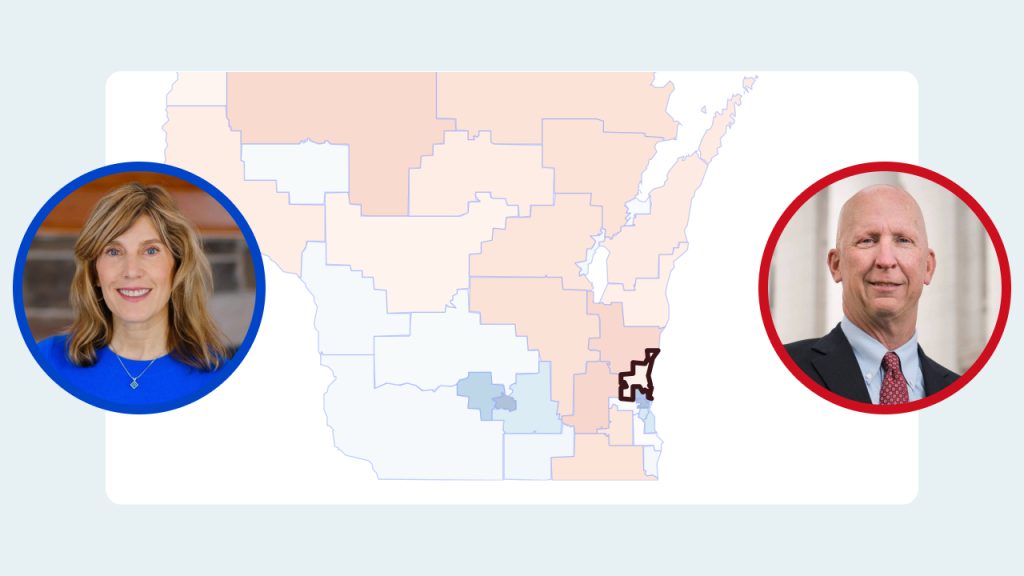
R: Duey Stroebel*
This might be the single most interesting race in the Wisconsin State Legislature happening this year. This is a district won by both Tony Evers and Ron Johnson, the only such district in the State Senate on the ballot this cycle.
State Sen. Duey Stroebel of Saukville is essentially the incumbent here, but he has long represented District 20, which, under old maps, stretched from Ozaukee County north to the eastern shores of Lake Winnebago. Now, he’ll be running in a district that makes much more sense, pulling together much of Ozaukee County, and other suburbs to the immediate north and northwest of Milwaukee. The District 8 incumbent is Republican Dan Knodl, who instead of running against Stroebel in a primary, chose instead to run for Assembly.
Stroebel has been a long-time cog in the Walker-Vos GOP machine. He has served in the State Senate for nearly a decade, following four years in the Assembly from 2011 to 2015. He has been a member of the Joint Committee on Finance since 2019, currently serving as Vice Chair. He’s also the Chair of the Committee on Government Relations.
When in the Assembly, he chose not to run for re-election in 2014, choosing instead to run for an open seat in Congress following the retirement of Tom Petri. But Stroebel lost in the primary, finishing third behind Joe Leibham and eventual winner Glenn Grothman. Stroebel was then elected to the State Senate in the early 2015 special election for Grothman’s seat. Since, he has run unopposed in every election, not seeing a primary or general election challenge in 2016 nor 2020. This will be the first competitive race he’s run in nearly a decade, and he’ll be doing so in a very different district than the one he’s represented — one that has shifted significantly to the left in recent election cycles.
The city of Cedarburg, for example — previously in District 20, in District 8 under new maps — became the first WOW county municipality to be won by a Democrat in a presidential election since the 1990s when Joe Biden won a majority there in 2020. The city of Whitefish Bay, part of this district along with other north shore suburbs, has been zooming to the left, going from a slight Republican advantage in the 2012 gubernatorial election to voting more than 70% for Tony Evers a decade later. Stroebel, no moderate by any stretch of the imagination, campaigning in places like Whitefish Bay is going to be a bit of an adventure.
Stroebel’s opponent in this race is Jodi Habush Sinykin, who is running again after nearly pulling off an upset in April 2023. In that race, a special election to fill the seat previously held by Republican Alberta Darling, Habush Sinykin came within less than 2% of flipping the district blue, a strong performance in a district that the math showed to be GOP+12, at the time.
Habush Sinykin is an attorney who has specialized in environmental law, particularly on water issues (she was part of the group that sued over Foxconn’s planned diversion of Great Lakes water). She and her husband own a textile manufacturing company based in Janesville, and she is also the daughter of Bob Habush of Habush, Habush & Rottier fame. She’s viewed as a very strong challenger in this race.
Expect millions of dollars to be spent on this campaign. It is going to be close, and could go a long way toward determining which party will win the majority in 2026. It will also serve as a true bellwether on how the crucial WOW county suburbs, Ozaukee in particular, are shifting.
CNalysis: TOSS UP
- Proj. margin: D+1
Modeled 2022 outcome: R+6.0
Previous coverage:
- Feb. 2023: ‘Digging into the race for Wisconsin’s 8th Senate District—the OTHER big race in Tuesday’s primary’ (Milwaukee Record)
- March 2023: ‘PODCAST: A conversation with Jodi Habush Sinykin, Democratic candidate in the 8th Senate District’ (The Recombobulation Area)
- April 2023: ‘Did gerrymandering help give Wisconsin Republicans a victory in the 8th Senate District?’ (The Recombobulation Area)
- Feb. 2024: ‘Democrat Jodi Habush Sinykin considering another run for State Senate in District 8 under new maps’ (The Recombobulation Area)
- March 2024: ‘Senator blocks task force on missing and murdered African American women and girls’ (Civic Media)
More: Jodi Habush Sinykin on the Civic Media airwaves
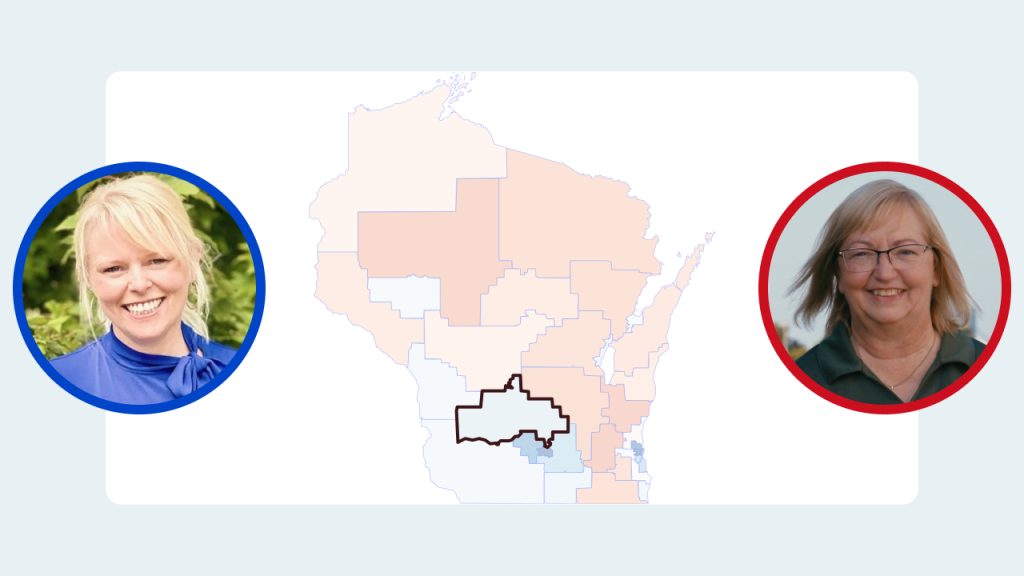
R: Joan Ballweg*
While District 8 saw split results from the midterm elections, District 14 is one won by both Tony Evers and Mandela Barnes in 2022, and is among the top targets for a Democrat to flip a district under new maps. In fact, Evers won this district by a nearly 10-point margin.
The 14th now includes cities like Baraboo, Portage, Richland Center and Wisconsin Dells, along with the city of DeForest on the north edge of hyper-blue Dane County. Columbia, Sauk, and Richland counties are all within this district, and Sauk has proven to be a real bellwether in Wisconsin, going for Obama in 2008 and 2012, Trump in 2016, and for Biden in 2020.
The incumbent here is Republican Joan Ballweg, who is moving to remain in the 14th. Ballweg, who did not face a primary challenge in this district, is seeking her second term in the State Senate, after serving eight terms in the State Assembly, beginning in 2004. She is currently the Chair of the Committee on Agriculture and Tourism and sits on the Joint Committee on Finance, and is part of Republican leadership as the Majority Caucus Vice-Chair. The same week she announced her re-election campaign, Ballweg joined Democrats on a Senate committee to vote against a bill that would bar transgender girls from participating in girls’ sports, and also voted against a similar bill in 2021.
Ballweg also has a long record of being anti-abortion and has opposed exceptions for rape or incest. Expect this to come up a whole lot in this campaign, as the first TV ad against her is on the topic of abortion rights.
Ballweg’s opponent for the general election will be Sarah Keyeski, who also did not face opposition in the primary. Keyeski is a political newcomer, and was initially going to run for Assembly before Gov. Evers signed the new maps into law. Keyeski has worked as a mental health counselor for nearly 25 years, and founded the community nonprofit, “Lift Lodi,” in 2021. In May of this year, the terrific New York Times podcast “The Run-Up” featured Keyeski, reporting from her home town of Lodi, with an episode titled, “The Democrats’ New Chance in Wisconsin.”
CNalysis: Lean D (FLIP)
- Proj. margin: D+5
Modeled 2022 outcome: D+6.7
Wisconsin Eye interviews:
More: Sarah Keyeski on the Civic Media airwaves

D: Jamie Wall
R: Jim Rafter
Green Bay and Brown County are going to be enormously consequential parts of the 2024 state legislative elections. There are two close Assembly races projected for the region, and District 30 will be a highly competitive race.
It will also be an open seat, with incumbent State Sen. Eric Wimberger moving to District 2, a heavily GOP-leaning district, and a more clear path for him to remain in the Senate. In fact, the new maps drew three Republican state senators into District 30 — Wimberger, Andre Jacque and Robert Cowles — but interestingly, none of them will be running in this district in 2024.
Instead, the Republican running here is Jim Rafter, who has served as the Village President of Allouez for the past eight years, and has served on the Village Board since 2014. Rafter has been a longtime advocate of closing the Green Bay Correctional Institution, saying it “has exhausted its lifespan and cannot provide those inside with the tools necessary to navigate a return to society.” He was part of a coalition who went to the State Capitol in April, urging the closure of the 126-year-old prison.
Democrat Jamie Wall is a business consultant who helped form New North, a regional economic development organization in Brown County and Northeast Wisconsin. He serves as the vice president of the Green Bay Water Commission and is a past board member of the Wisconsin 4-H Foundation and the Clean Wisconsin Action Fund. In 2012, Wall ran for Congress, losing to Republican incumbent Reid Ribble, 56% to 44%.
CNalysis: Tilt D (FLIP)
- Proj. margin: D+3
Modeled 2022 outcome: D+5.3
Wisconsin Eye interviews:
More: Jamie Wall on the Civic Media airwaves and Jim Rafter on the Civic Media airwaves
The Close Races with Democratic Favorites (2)
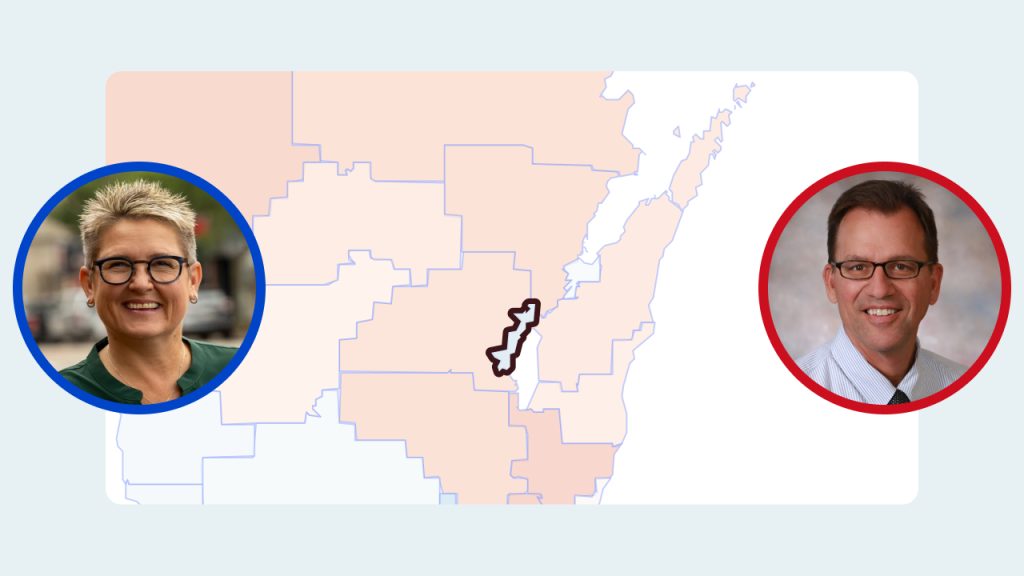
The Fox Valley is among the swingiest regions in the state of Wisconsin, but under old maps, for more than a decade, there was no Democratic state senator serving in the Fox Valley. That projects to change now. The 18th is essentially a brand new district, running along the northwest side of Lake Winnebago, including cities like Neenah and Menasha, and much of Oshkosh and Appleton. This projects to be a pick-up opportunity for Democrats.
The Democrat running in this district is Kristin Alfheim, who currently serves as an alderperson and the vice president of the Appleton Common Council. She ran for State Senate two years ago in then-District 19, losing to Republican Rachael Cabral-Guevara. Alfheim has also been on the Board of Directors for the Alzheimer’s Association of Greater Wisconsin for many years, and before running for office, she worked as a retirement planner. She’s also a member of the LGBTQ community, and is a spotlight candidate in the national LGBTQ+ Victory Fund.
She’ll face Anthony Phillips, who won a competitive primary in August over Blong Yang, 62% to 38%. Phillips is a political newcomer who worked for nearly 30 years as a cancer physician in Appleton and Neenah, at Fox Valley Hematology and Oncology and ThedaCare Oncology. He announced his candidacy with a particular focus on his opposition to transgender athletes competing in youth sports.
CNalysis: Very Likely D (FLIP)
- Proj. margin: D+12
Modeled 2022 outcome: D+11.1
Wisconsin Eye interviews:
More: Kristin Alfheim on the Civic Media airwaves
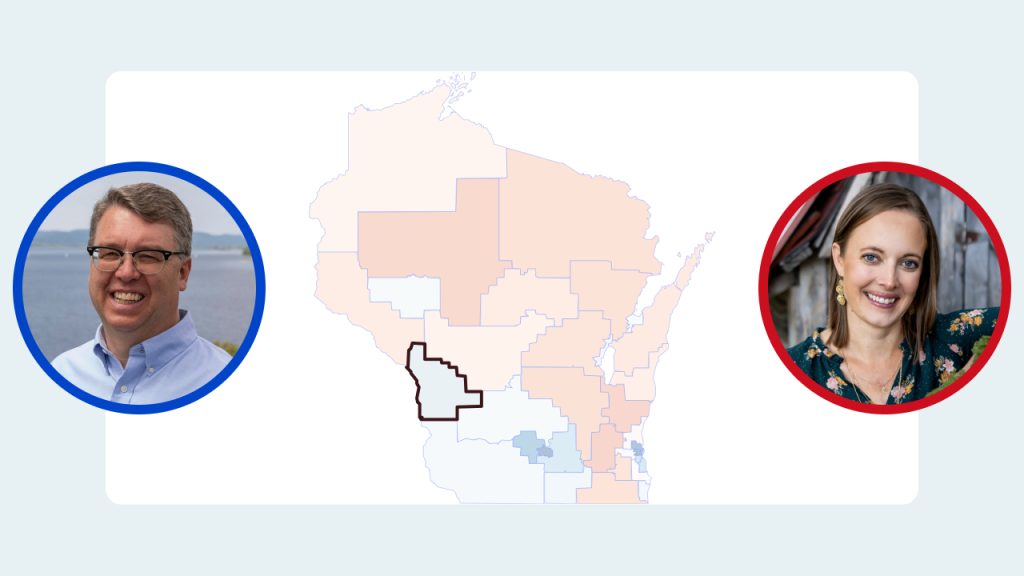
D: Brad Pfaff*
R: Stacey Klein
In 2020, Brad Pfaff won the closest race on the map in the State Senate, defeating Republican Dan Kapanke by less than 600 votes. This helped protect the governor’s veto, and kept Republicans one seat shy of a Senate supermajority. In 2022, Pfaff ran for Congress, coming much closer than many might have expected against Republican Derrick Van Orden — 51.8% to 48.1% — a race many feel could have been won by the Democrat with more support from the national party.
Before running for State Senate, Pfaff served as the agriculture secretary-designee under Gov. Evers, but was fired by the Republican leadership in an unprecedented move. Pfaff also was a long-time staff member for Rep. Ron Kind, and worked for the USDA under President Barack Obama. Pfaff is now seeking a second term as a state senator in this La Crosse area district in western Wisconsin.
Stacey Klein is the Republican challenger in this race. She was initially running for U.S. Senate this year, but in April, chose instead to run for State Senate. She was criticized for anti-LGBTQ comments made during her brief campaign against Tammy Baldwin. Klein currently serves on the Trempealeau County Board of Supervisors, and is the treasurer for the Republican Party of Trempealeau County.
CNalysis: Likely D
- Proj. margin: D+9
Modeled 2022 outcome: D+8.3
Wisconsin Eye interviews:
More: Brad Pfaff on the Civic Media airwaves
Safe Republicans (6)
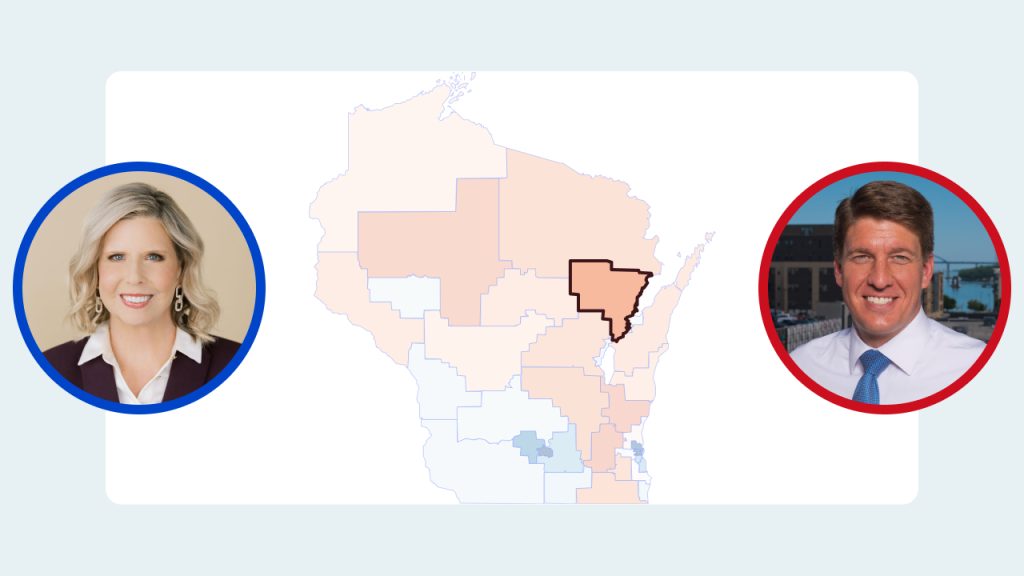
R: Eric Wimberger*
Eric Wimberger currently represents District 30 in the State Senate. But now, he’s running in District 2.
Wimberger is moving to run in a more Republican-leaning district in order to have a more clear path to remain in the Senate. He’ll be avoiding a more competitive race in the 30th — one of three “Toss-Up” races — and pushing out State Sen. Robert Cowles, who is retiring after 42 years serving in the Senate.
Wimberger will face former broadcast journalist Kelly Peterson, a candidate who was considering a run for Congress before opting for the State Senate.
CNalysis: Solid R
- Proj. margin: R+26
Modeled 2022 outcome: R+30.6
Wisconsin Eye interviews:
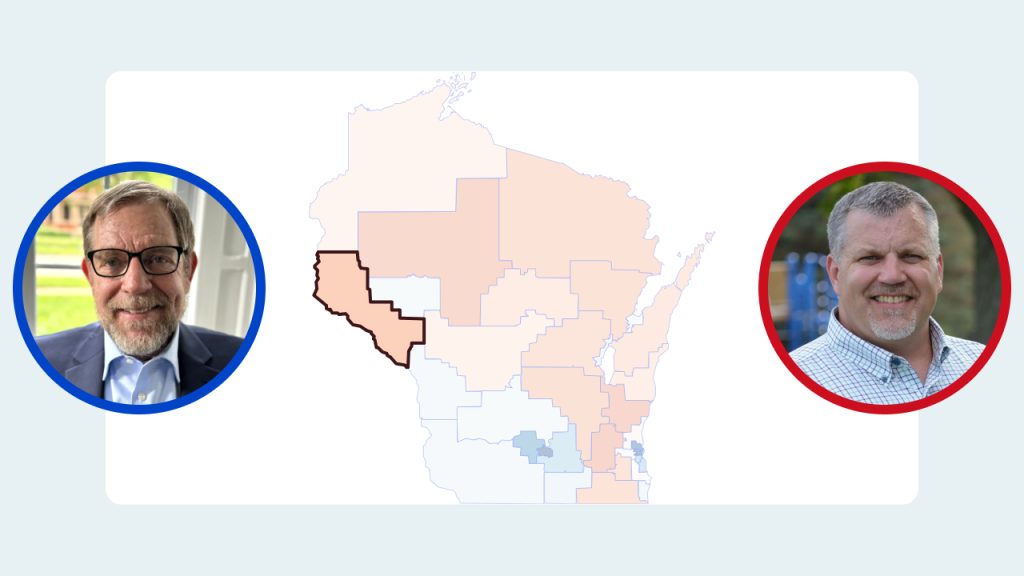
District 10
R: Rob Stafsholt*
Stafsholt made the jump from Assembly to Senate in 2020, flipping a deep red seat in northern Wisconsin that Democrat Patty Schachtner had won in a special election over Republican Adam Jarchow. Stafsholt served as the Chair of the Committee on Financial Institutions and Sporting Heritage in the Senate last session.
Hambleton is a former teacher and the current chair of the St. Croix County Democrats.
CNalysis: Solid R
- Proj. margin: R+18
Modeled 2022 outcome: R+22.2
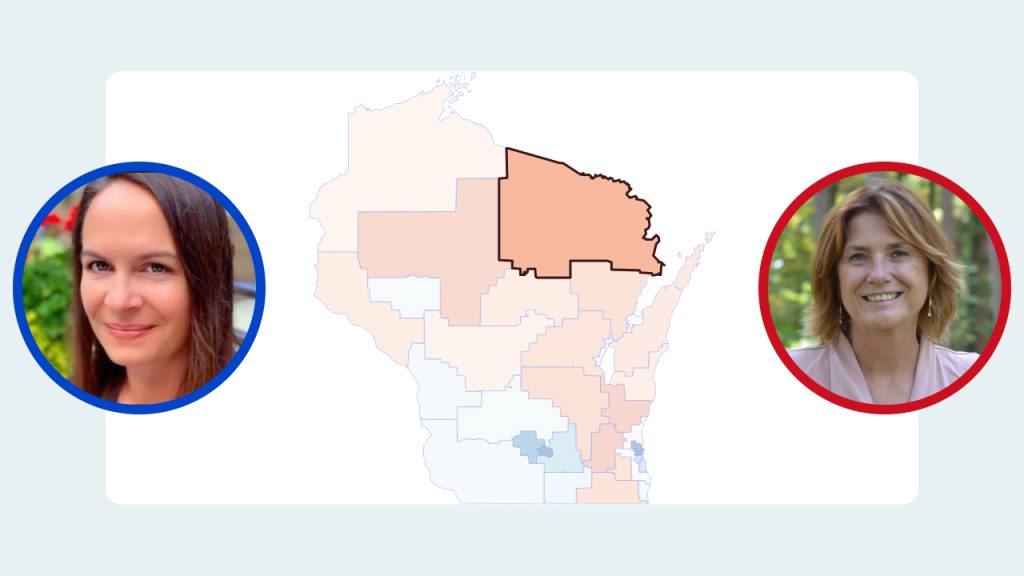
D: Andi Rich
R: Mary Felzkowski*
State Sen. Felzkowski was among those in the legislature who led the effort to reform the state’s shared revenue system. She is the Chair of the Committee on Insurance and Small Business, and serves on the powerful Joint Committee on Finance, and has been a top proponent among Republicans for legalizing medical marijuana in Wisconsin. She recently was in the news, as the Lac du Flambeau Ojibwe Tribal Council banished her from its land after she referred to the tribe as “terrorists” in a public meeting.
Rich is a small business owner who launched her campaign with a focus on clean water. In 2020, she ran as a Republican in a primary for the 89th Assembly District, losing to incumbent John Nygren.
CNalysis: Solid R
- Proj. margin: R+27
Modeled 2022 outcome: R+30.7
Wisconsin Eye interview:
More: Andi Rich on the Civic Media airwaves.
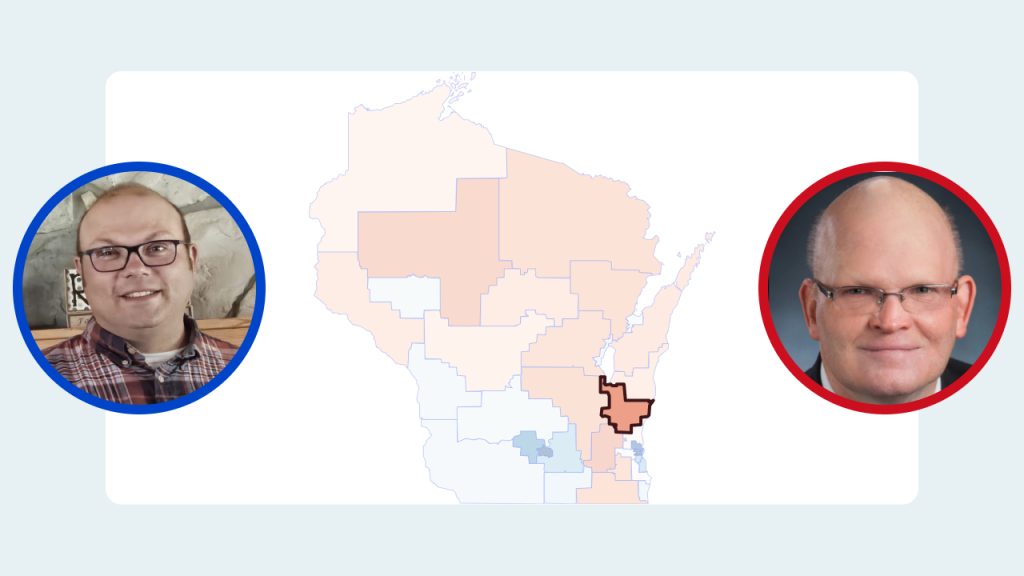
D: Michael Rapp
R: Dan Feyen*
Dan Feyen is a member of Republican state legislative leadership as the Assistant Majority Leader. In the most recent session, he was among the lead authors of the bill to keep the Milwaukee Brewers in town until 2050, and has since been appointed to the Board of Directors for the Wisconsin Professional Baseball Park District.
In August, he faced a primary challenge from far-right election denier Timothy Ramthun, which reportedly had some Republican leaders shook, but Feyen won the primary handily, roughly 65% to 35%. In the general election, Feyen will face Democrat Michael Rapp, a political newcomer.
CNalysis: Solid R
- Proj. margin: R+35
Modeled 2022 outcome: 38.8
Wisconsin Eye interview:

R: Patrick Testin*
Of these “safe Republican” districts, this is one that the math suggests would project to be the closest result. But incumbent State Senator Patrick Testin is a clear favorite in this central Wisconsin district that includes the cities of Stevens Point and Wisconsin Rapids. Testin has recently served as the Chair of the Committee on Labor, Regulatory Reform, Veterans and Military Affairs, and a member of the Joint Committee on Finance.
In 2022, Testin came in second in the Republican primary for Lieutenant Governor, finishing with 18.4% of the vote, behind Roger Roth. In 2020, after serving as the chair of the Committee on Health and holding no public hearings during the height of the pandemic, he was re-elected by a double-digit margin. Now in 2024, seeking his third term, he’ll face political newcomer Collin McNamara.
CNalysis: Very Likely R
- Proj. margin: R+14
Modeled 2022 outcome: R+15.0
Wisconsin Eye interviews:
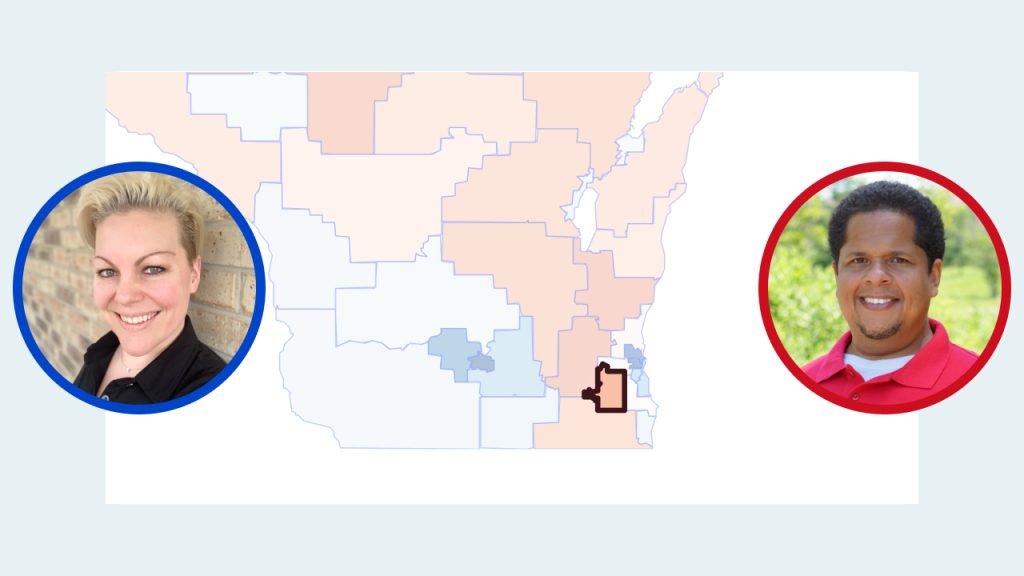
District 28
D: Megan Lach
R: Julian Bradley*
When new maps were revealed and ultimately approved, first-term State Sen. Julian Bradley was drawn in with fellow Republican Van Wanggaard. Bradley moved to remain in the 28th, a heavily GOP-leaning district in southeastern Waukesha County. Parts of this county might be shifting significantly, but this still projects to be a deep red seat.
Bradley serves as the Chair of the Committee on Utilities and Technology and the Legislative Council Study Committee on the Regulation of Artificial Intelligence in Wisconsin. Bradley also ran for Secretary of State in 2014, losing to Doug LaFollette. He’ll face Democrat Megan Lach, a political newcomer who currently works in digital marketing.
CNalysis: Solid R
- Proj. margin: R+23
Modeled 2022 outcome: R+28.4
Wisconsin Eye interview:
More: Megan Lach on the Civic Media airwaves
Uncontested Democrats (5)
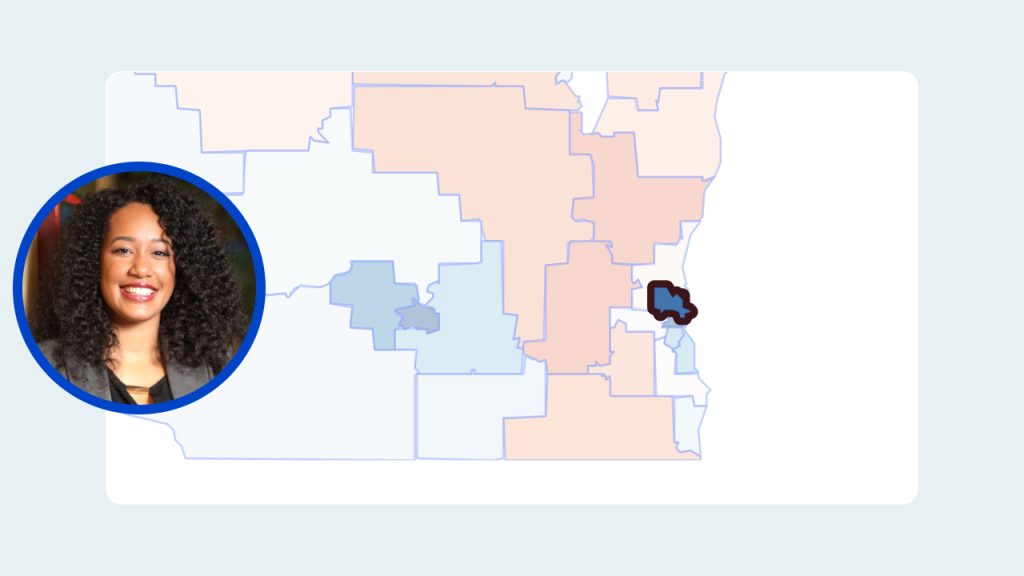
District 4
D: Dora Drake*
R: NO CANDIDATE
This race was settled once and then settled again this summer, with a special election to finish the term of former state senator Lena Taylor (who vacated the seat after being appointed to a seat on the Milwaukee County Circuit Court) which was then followed quickly by the primary for the next four-year term. In both races, no Republican ran, the Democratic primary was between Assembly representatives Dora Drake and LaKeshia Myers, and Drake won handily with more than 60% of the vote.
This is one of several districts in and around the city of Milwaukee where Republicans did not field a candidate. None of the three Assembly districts included in this Senate district will have a Republican candidate, either. The GOP isn’t even competing in communities like Shorewood, Glendale, and north and northwest Milwaukee.
CNalysis: Uncontested D
Modeled 2022 outcome: D+69.2
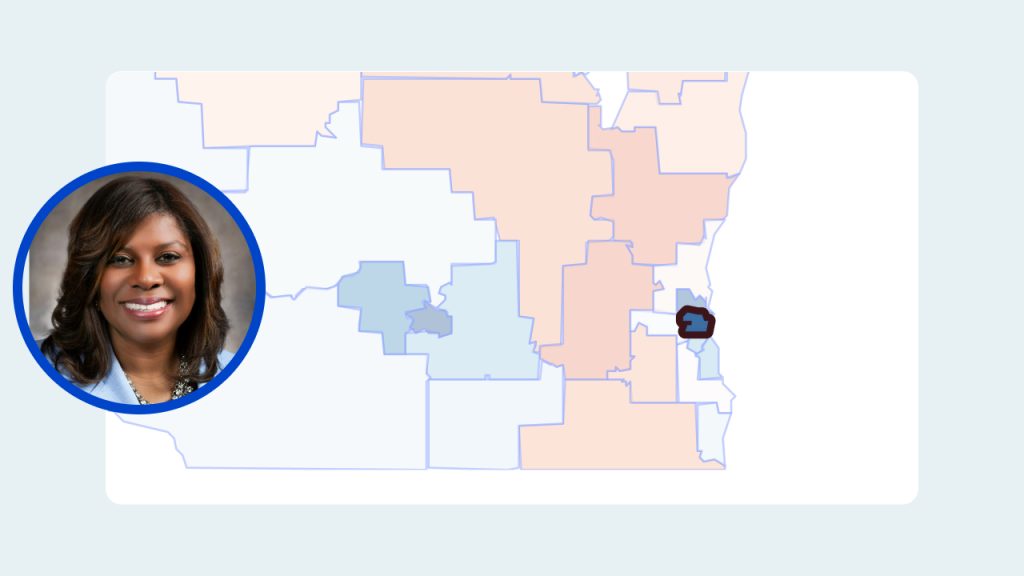
District 6
D: LaTonya Johnson
R: NO CANDIDATE
With no Republican opponent, LaTonya Johnson will head toward a third term in the State Senate, where she serves on the powerful Joint Committee on Finance.
CNalysis: Uncontested D
Modeled 2022 outcome: D+72.1
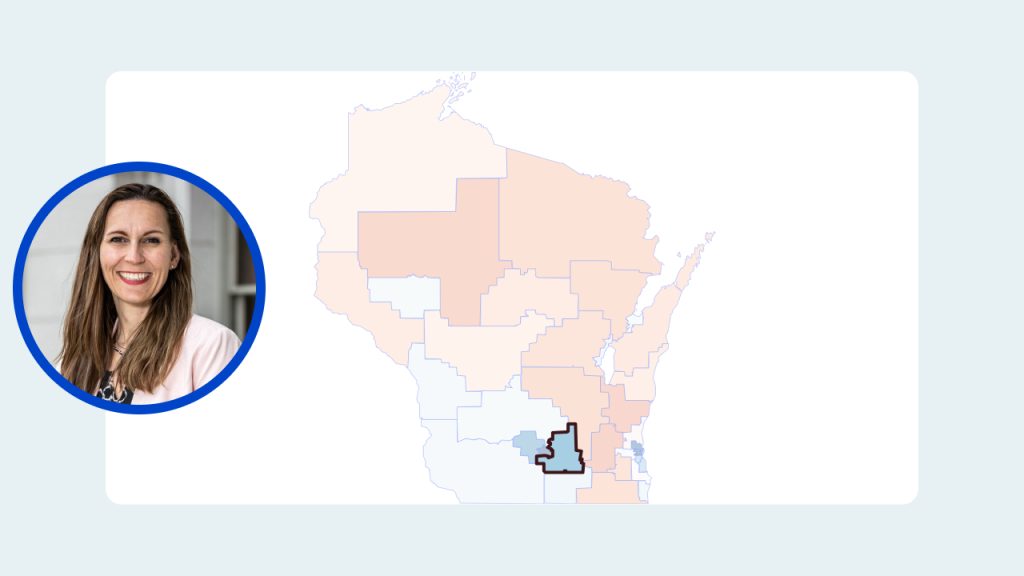
D: Melissa Ratcliff*
R: NO CANDIDATE
In this Dane County district, Ratcliff won more than 50% of votes in a three-candidate Democratic primary that featured three current Assembly representatives. State Rep. Jimmy Anderson came in second with 31% and Baldeh third with 17%. Ratcliff is a first-term state representative who previously served on the Dane County Board.
CNalysis: Uncontested D
Modeled 2022 outcome: D+32.1
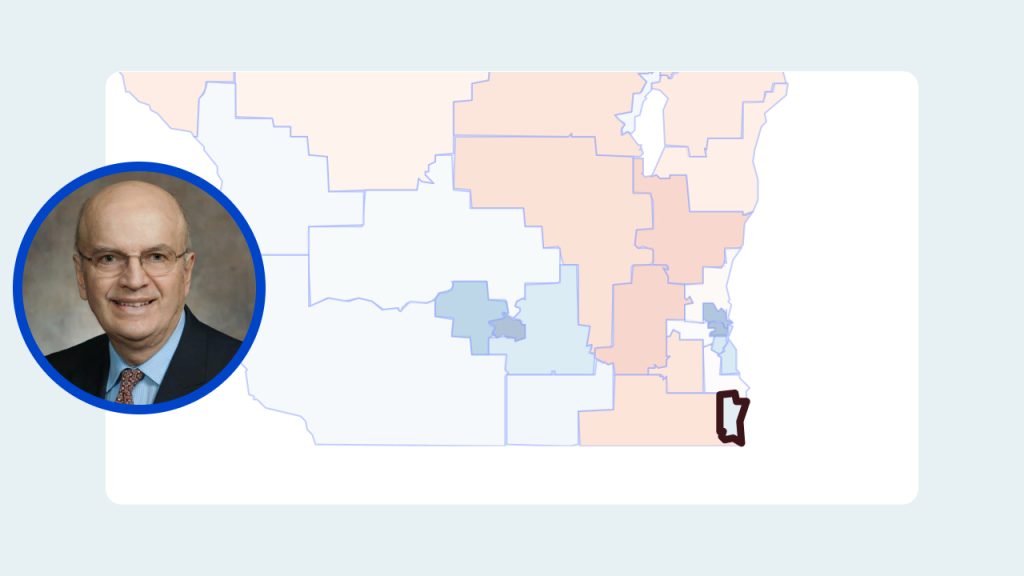
D: Robert Wirch*
R: NO CANDIDATE
Republicans have made gains in Kenosha County in recent election cycles, even winning the race for Kenosha County Executive in 2022, but aren’t mounting a challenge against Robert Wirch, who has served in the State Senate since 1997. This district now includes part of southern Racine County.
CNalysis: Uncontested D
Modeled 2022 outcome: D+11.8
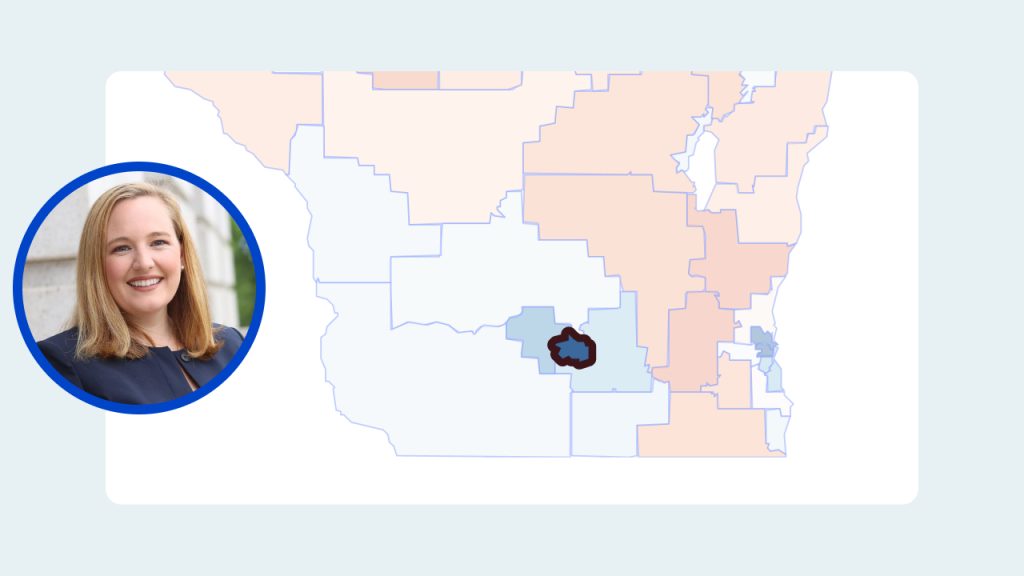
D: Kelda Roys
R: NO CANDIDATE
With no Republican opponent, Kelda Roys will head toward a second term in the State Senate, where she serves on the powerful Joint Committee on Finance.
CNalysis: Uncontested D
Modeled 2022 outcome: D+73.8
The Recombobulation Area and Civic Media are previewing every race on the ballot in the Wisconsin State Legislature. This part of the guide is on the Wisconsin State Senate. Stay tuned to find our guide of the Wisconsin State Assembly.
Find more from Dan Shafer at The Recombobulation Area.
Want More Local News?
Civic Media
Civic Media Inc.
The Civic Media App
Put us in your pocket.

